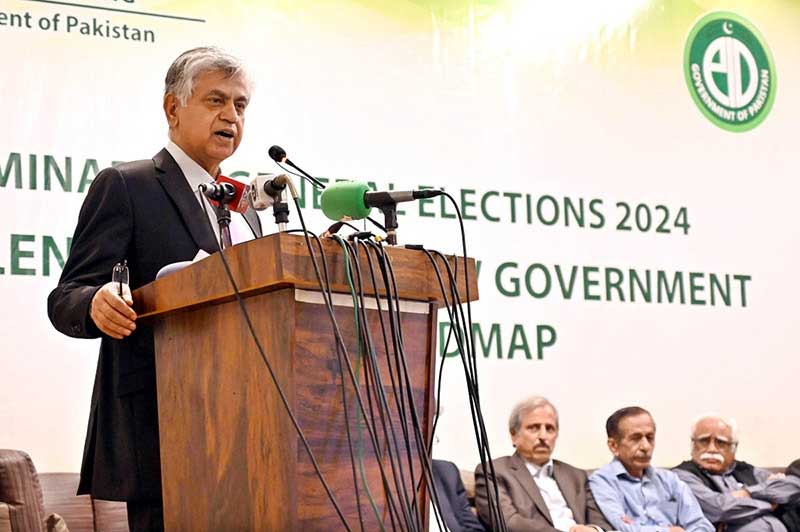
KARACHI: While other countries were advancing in the tech industry, Pakistan was battling poor broadband infrastructure, inadequate human resources, and deteriorating security issues. These issues barred Pakistan’s tech and IT industries from advancing. Pakistan cannot be called an underdeveloped market for the IT sector because it comprises many IT firms and startups in the cycle, but it can be referred to as a country of untapped individuals with remarkable potential. With a population of over 240 million people, 64% of whom are young individuals, a large portion remains untapped.
A senior Pakistan IT exports expert, Mr. Omair Ahmed Siddiqui, says, “Pakistan has been experiencing backbreaking inflation and political instability, which has led to an economic meltdown. Pakistan’s external debts exceed its federal government’s total revenue. People often ignore that to facilitate this youth bulge, Pakistan needs an updated economic infrastructure to support the youth. Without the needed facilities, the youth will only burden the economy”.
He said, “America is the world’s largest and most integrated market with reasonable tax rates. The U.S. tech industry is the largest tech market in the world, representing one-third of the $5 trillion global IT market. For years, America has been a hot spot for startups and entrepreneurs wanting to grow their businesses. Their model suggests that America focused on empowering and enabling its people and utilized their potential for its own growth rather than offshoring them as a workforce to gain short-term benefits. It is common knowledge that India and Pakistan started on the same ground but are now worlds apart. India’s IT exports reached $193 billion in 2022-23, excluding hardware exports and only comprising software-based IT services. Many tech giants like Microsoft, Amazon, and Google outsource their processes to India’s skillful workforce. India receives direct foreign funding from these tech giants and is home to a booming tech industry owing to its modernization strategy. Currently, there are an estimated 108 unicorns operating in India at a global level. Startups in India have been gaining global attention and are now attracting wealthy venture capital and equity firms.” Siddiqui says, “In my opinion, Pakistan won’t be able to create a globally recognized tech and IT sector with its current model. Like India, Pakistan needs to focus on its services trade as it will utilize Pakistan’s workforce for its own benefit rather than wasting its potential working for foreign IT firms. Pakistan needs a better digital infrastructure as it is very uncertain and disarrayed. The broadband services are unreliable, and on top of that, a massive chunk of Pakistan’s land with significant population densities does not even have access to the internet. Frequent and widespread power outages are another pressing issue because nationwide electricity blackouts are common in Pakistan. Pakistan is not investing in infrastructure, and the generated or available capital is not directed to the right channels. Business leaders can aid the mobilization of capital in local markets, which will, in turn, benefit Pakistan’s IT market. Business leaders must closely coordinate with the government to aid Pakistan’s IT exports”.
He said, “The government needs to develop sound policies and aid its youth in boosting the IT sector while giving them opportunities to secure payments from international clients through prominent payment platforms. The government’s recent efforts to bring PayPal to Pakistan are laudable, but they did not materialise effectively due to the overarching role of traditional financial institutions and the exclusion of industry veterans. The government’s narrow approach of following conventional financial institutions and software associations like the Pakistan Software Houses Association (P@SHA) hinders growth due to a lack of expert inclusion.
Siddiqui further stated, “Registering a business alone is a hassle in Pakistan, stymying entrepreneurship and startups. Entrepreneurship and freelancing are also catching the attention of Pakistan’s youth, but the challenges they face in performing due diligence and financial management are prominent issues that must be addressed. To streamline the due diligence procedures that often impede progress, business leaders must turn toward fintechs and industry experts instead of traditional financial institutions that take days to complete a single task.”
Pakistan’s top IT leader’s statement reflects a growing concern among industry veterans regarding the government’s policy of excluding prominent IT leaders from decision-making. The government must include all stakeholders, including industry leaders, in the decision-making and policy development processes to develop concrete policies that benefit the IT industry and economic progress. Leading industry experts can provide valuable insights to the new government for international payment processing disciplines and other technical and financial challenges due to their vast experience of IT export operations and financial payment processing.
“Following India’s footsteps may work; offering outsourcing services and utilizing the generated capital to develop software services is what Pakistan should do. Venture capitalists in Pakistan must identify this pressing issue and invest in entities that have the potential to create services that can be traded across borders. The strategy can put Pakistan on the global IT map and pave a smooth path for future advancements. Pakistan’s government needs to provide proper and up-to-date learning to its youth. Pakistan has a lot of people with valuable skills, but these people have no direction. They should receive appropriate mentorship and education to help them harness their true potential. Software companies can utilize these skilled people to create competitive services in the global market,” Omair Ahmed Siddiqui tells The Financial Daily.




